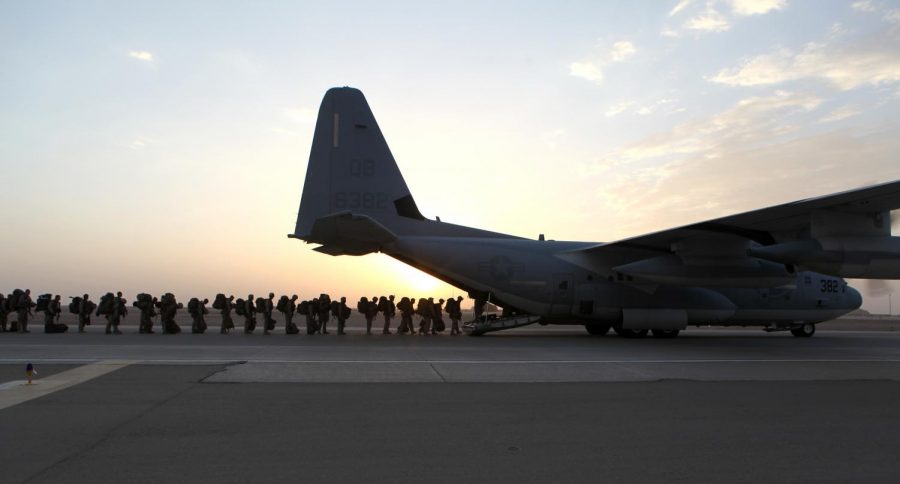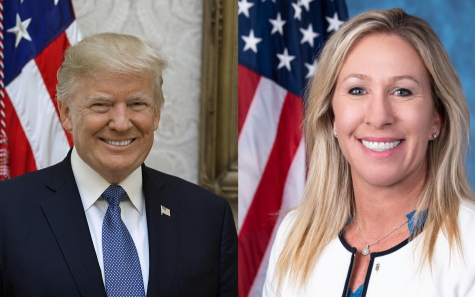The true lessons of the Afghan affair
Photograph courtesy of Defense Visual Information Distribution Service (US Dept. of Defense)
Marines and sailors with Marine Expeditionary Brigade – Afghanistan load onto a KC-130 aircraft on the Camp Bastion flightline, Oct. 27, 2014. The Marine Corps ended its mission in Helmand province, Afghanistan, the day prior and all Marines, sailors and service members from the United Kingdom withdrew from southwestern Afghanistan.
“As we turn the page on the foreign policy that’s guided our nation the last two decades, we’ve got to learn from our mistakes…First, we must set missions with clear, achievable goals, not ones we’ll never reach. And second, we must stay clearly focused on the fundamental national security interest of the United States of America.” So said President Biden in his address to the nation on August 31, 2021, announcing that the evacuation of Afghanistan was complete and that US military ground operations in Afghanistan were at an end. The lessons he claimed we needed to learn from this, that we must restrict our foreign policy to narrowly defined and targeted objectives that are clearly within our interests, were echoed in a recent Journal article by our esteemed new editor, Jacob Friedman.
I am afraid I must respectfully disagree. This is a reoccurring theme in modern American foreign policy and society, when a foreign policy initiative becomes particularly unpopular or prolonged and the political will for it evaporates, the argument inevitably emerges that the initiative had overreached and gone beyond the national interest. From this, the argument follows that America must learn its limitations, that we must act only when we have a vital interest and narrowly defined objectives along with a clearly defined path to meet those objectives. This desire for limited commitment almost always ends in tragedy.
The most prominent instance of this is the US response to the failure of the Vietnam War. What makes that period of self-restriction and narrow policy particularly relevant is that this mindset is what led to the creation of the Taliban in the first place. As described in Steve Coll’s seminal history of US involvement in Afghanistan prior to 9/11, “Ghost wars,” the sting of the Vietnam War and subsequent scandals left many in the American foreign policy apparatus wary of getting entangled in local issues and dedicated to avoiding anymore “CIA-led quixotic quests for Third World hearts and minds.” Thus, the US approached its intervention in the Afghan-Soviet war with a simple objective: make the Soviet intervention in Afghanistan as costly in blood and treasure as possible by supporting guerrilla forces. They had no interest in serving as kingmakers, no interest in getting involved in the politics of the Islamists and Royalists among Afghan resistance, they only cared about dead Soviet soldiers being sent back to Moscow. The program evolved and more resources were devoted to it, with the goal eventually shifting from simply making the Soviet intervention costly to making it fail entirely, but the United States continually avoided getting involved in Afghan affairs, preferring to simply provide the resources and leave the politics to the Pakistani intelligence service.
This offers a perfect example of the success of targeted initiatives with limited commitment and narrowly defined objectives that fall clearly within the national interest, so long as one looks at it in a vacuum. The initiative was a limited expenditure of American resources, military materiel and money with minimal risk to any American lives. The objectives were clear and narrowly defined, increase the costs of Soviet intervention and eventually drive them out of Afghanistan. American interest in the matter was also easily discernible, weakening its Cold War adversary militarily and economically while deterring further Soviet interventions in the Third World. When judged on these merits, the program was a spectacular success – there is substantial argument that the failure of the Soviet intervention in Afghanistan did hasten the collapse of the Soviet Union, there was no cost in American lives (and relatively little financial cost) and the United States was able to make a clean exit once our objectives had been accomplished.
The problem is that the story does not end there. Even after the US and the Soviet juggernauts had lost interest, the story of Afghanistan continued. The Afghan resistance had been a fractious group with divergent ideologies and goals from the beginning, united only by their desire to drive the Soviets out and overturn their puppet government. After the Soviet Union collapsed and the proxy government in Kabul fell, they lost their unifying enemy. As happens so often in such situations, things quickly devolved over the issue of who would lead and what vision would guide their country into the future. The country fell into chaos as warlords claimed regions and fought for supremacy while crime and corruption surged in the absence of the rule of law.
This chaos continued until 1994, when a new force emerged. A small militia led by religious students, translated in Pashto as Talibs or Taliban, educated in Saudi Arabian-funded religious schools in Pakistan. It is important to distinguish the Taliban from the Mujahideen, as the leaders of the Mujahideen – figures such as Gulbuddin Hekmatyar and Ahmed Shah Massoud – served as the primary opponents of the Taliban in their rise to power. Following the Taliban’s rise to power, Afghanistan was established as a sanctuary state for Islamist terrorist groups and seven years later, on Sept. 11, 2001, the US paid the price for its narrowminded approach to Afghanistan.
Do not misunderstand me – I do not suggest in the slightest that the attacks of 9/11 were deserved, only that they might have been preventable. Had the United States taken a broader approach, worked to elevate moderate factions in the Afghan resistance and planned for a post-Soviet Afghanistan, Al Qaeda would not have found a sanctuary in which to grow and prosper and might not have been able to launch the attacks. This highlights the first major reason narrow foreign policy does not work: there are always second order effects and a policy that is entirely successful within the narrow confines of its objectives can come back to haunt us in horrific ways. Thus, I offer my first lesson for the United States to take from the Afghan affair: foreign policy is not a scalpel. At its most mundane, foreign policy is tossing pebbles into a pond so that the ripples from the splash will move a lily pad into a certain preferred position. At its most extreme, foreign policy is tossing cinder blocks off a highway overpass in hopes of hitting a specific car; even if you hit the correct target, you are setting off a chain reaction that must be accounted for.
When the United States invaded Afghanistan in 2001, it did so with narrowly defined objectives and a clear exit strategy. We were going in to degrade and destroy the Taliban regime and establish a provisional government under international supervision in order to ensure Afghanistan would no longer provide a sanctuary for Al Qaeda, then we would withdraw military forces. Very straightforward on paper, and the initial stages went almost perfectly, as described in “Lessons Encountered: Learning from the Long War,” a publication examining the Afghan occupation published by the National Defense university. The problems came after the battles had been won and the enemy driven from the field. US and Coalition policymakers had severely underestimated the damage done to both physical and social infrastructure by 24 years of war, warlordism and incompetent rule by violent fundamentalists, as well as the reticence of international organizations such as the UN to act without US commitment and the resiliency of the Taliban and other militants. Thus. we come to the second major reason that narrow foreign policy does not work: Superpowers never enter into major foreign interventions lightly – particularly when armed force is involved, they always believe that they have a set of narrowly defined and achievable objectives with a clear exit plan, until reality gets in the way. This brings us to the second lesson for the United States to take from the Afghan affair: Intervention in a foreign country is a marriage, not a prom date. States can and should plan and prepare as much as possible before intervening in the affairs of a foreign nation, because doing so is a long-term or even a lifetime commitment and it should be treated as such. However, there will always be unknowns that cannot be accounted for prior to acting and the only way to address them is to adapt as they emerge.
These two conclusions paint a rather depressing picture, States must adopt a broad foreign policy approach in order to account for unknown second order effects, but no matter how thoroughly they plan, there will always be unknowns that cannot be accounted for before acting. A possible reaction to this is to declare that the United States should eschew major foreign interventions altogether and this is indeed a widely held belief. It is arguably the central approach called for by the Biden administration, having declared an end to the “era of major military operations to remake other countries” and it is one possible interpretation of Friedman’s declaration that the withdrawal from Afghanistan “should be a clarion call to us that our government must stop going beyond the original missions of eliminating threats to us, supporting our allies and democratic principle and not engage in the imprudent and reckless project of nation building.”
There is merit to this argument, for too long the balance of American foreign policy has tipped too far towards military action and diplomacy has been sidelined and it is indeed time for a resurgence of American diplomacy and rebalancing of diplomatic and military priorities. It is also possible that terrorism can be contained with low-commitment counterterrorism measures such as air strikes and special operations raids, but it can never be defeated in such a way, as these measures do nothing to address the underlying conditions that drive individuals to such causes. Just as in crime, solutions that do not target the underlying causes are not solutions at all, merely holding actions. Diplomacy can do more to address this, but there are some areas where aid cannot reach and some actors who cannot be persuaded.
This brings us to our third scenario, one outside of Afghanistan and prior to 9/11, and our third and final lesson. On April 6, 1994, a plane carrying the Rwandan and Burundian presidents was shot down, killing all passengers. This event initiated 100 days of genocide which, according to the Journal of Genocide research, resulted in the murder of approximately 500,000 members of the Tutsi minority in Rwanda and further destabilized the already troubled region. Where was the US, one might ask, the global superpower still fresh from its Cold War victory bound by convention to “take measures to prevent and to punish the crime of genocide”? Freedom of Information Act requests by the National Security Archive have established that US senior policymakers were fully aware of the genocide taking place and chose not to intervene due to a desire to avoid a repeat of American involvement in Somalia and the infamous “Black Hawk Down” incident and a decision that “the US had no interests in Rwanda.” Thus, the US did not intervene, it restricted itself to diplomacy and public statements, and the Clinton administration later put forward Presidential Directive 25 to limit future US involvement in peacekeeping operations. This represents a moral stain on the United States and the effects of this genocide are still felt in the region and perpetuate conflicts to the time of this writing. Thus, we have the third problem with narrow foreign policy: There are some situations in which low-commitment actions cannot provide a solution, where diplomatic denunciations will be ignored and air strikes or special operations are insufficient. On such occasions, when innocent lives are under threat and violent extremists are on the march, the only options available are a robust American response backed by force or allowing the intolerable and suffering the aftereffects. The third lesson to be taken from Rwanda and the Afghan affair is, thus: intervention bears costs, but so does nonintervention.










